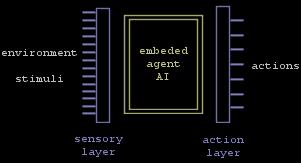The Future of Game AI: Intelligent Agents
By ai-depot | June 30, 2002
Agent Design
Technology
As you may expect, there are various ways of solving the problem of creating an intelligent agent. The field of Artificial Intelligence has produced many algorithms capable of dealing with such data streams, and potentially learn from them. This includes Evolutionary Artificial Neural Networks (EANN), Reinforcement Learning (RL), Hierarchical Transition Networks (HTN), Planning and Bayesian Networks among many others.

Figure 3: Representation of an agent embeded within it’s virtual body, allowing it to interact with the environment.
Once of the first things to do is to consider the agent as an embedded entity. Namely, we place the AI inside a virtual body within the environment, and make sure we respect this condition: there is to be no accessing global data. A filter can also transform the incoming data from the environment to simulate sensorial inaccuracy. This is fundamentally different to the scripting approach, where perfect results are generated, and the imperfection is laid over the top. As for the output, noise can also be applied to the required actions in order to impose these constraints on the AI.
One other thing that will eventually become imperative is agent design. For simple solutions, a single algorithm mentioned above may be able of coping with all the information. However, as the agent becomes more complex due to increased requirements, modularity will become vital. That’s a key concept of modern AI. To date, the only reliable way of organising these modules remains human design. That’s where the experience and comes in…
Benefits
At this stage, you may still be wondering why all this is necessary, and why the good old scripts can’t do the job. Well, improving the intelligence of game agents will allow them to:
- Adapt to changes in design and dynamic environment conditions
- Display genuine behaviour rather than canned behaviours
- Increase flexibility, implying less hard-coding
However, just like any other cutting edge technology, smart agents have their drawbacks.
Problems
Most of these problems have a solution, which can be more or less simple depending on your requirements, once again.
- You’ll find the need for academic solutions eventually. This is not necessarily a bad thing, but it’s something you should prepare yourself to.
- Speed can be an issue, but experience and knowledge will allow you to optimise your solution to shreds, just like every other part of the game. It’s often possible to match performance of scripts with ‘better’ AI.
- When learning is used, getting the desired results can be tricky. Keeping your designer happy will involve creating black-box behaviours that the AI will learn to make use of.
Conclusion
Intelligent Agents will be a very important part of game AI in the near future. Attitudes are changing quickly, as more and more power is made available for such things, but it will take a while for all the game characters to have elaborate AI. At first, expect only key characters to dispose of flexible reasoning capabilities, and background NPC to stick to finite state machines or scripts. Level of Detail AI is already revealing itself as a key problem of agent creation.
These revolutionary agents have mostly advantages, including flexibility, simplicity, and quicker development times. However, their creation does require some expertise, which is slowly spreading across the entire industry. The other problems raised are minor issues which will be resolved as more resources (human or computer) are dedicated to the problem.
Written by Alex J. Champandard.
Tags: none
Category: essay |

